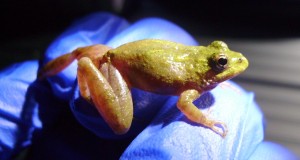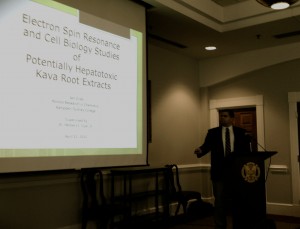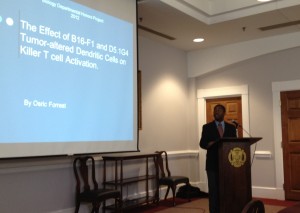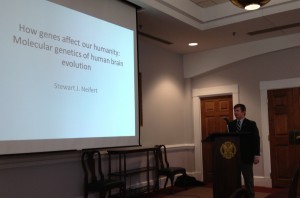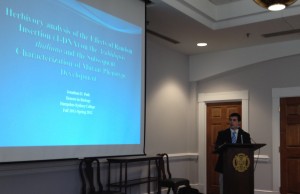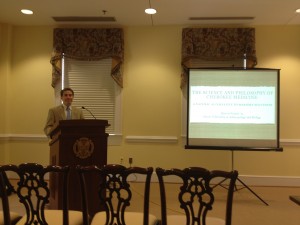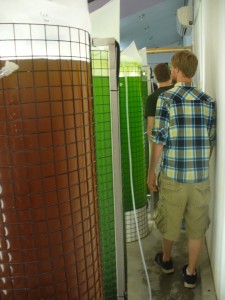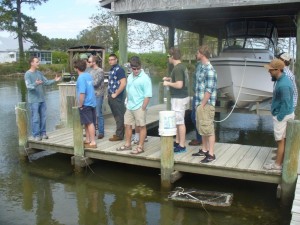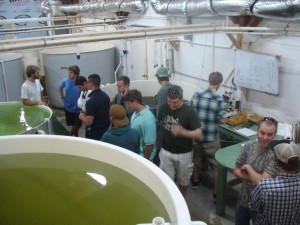On Saturday, April 21, junior biology major Yonathan Ararso gave a poster presentation at the 2012 Spring Conference for the Virginia Collegiate Honors Council Meeting held at Randolph-Macon College. Yonathan presented research conducted in the summer of 2011 under the supervision of Hampden-Sydney College biology professor Dr. Kristian Hargadon. Yonathan’s research focused on comparing the gene and protein expression profiles of immunosuppressive molecules in two melanoma cancer cell lines, the highly aggressive B16-F1 melanoma and the poorly tumorigenic D5.1G4 melanoma. Yonathan identified TGFbeta1 and VEGF-A as two immunosuppressive molecules that were more highly expressed in the highly aggressive tumor. He will continue this research as part of a Senior Departmental Honors Project in Biology with Dr. Hargadon to evaluate the roles of these two immunosuppressive factors in the suppression of dendritic cells, an immune cell whose function is critical to the activation of anti-tumor immune responses.
Monthly Archives: April 2012
Dr. Goodman and Yonathan Ararso ’13 publish note on pathogen in local frogs
Th recent volume of Herpetological Review featured results of surveillance for two wildlife diseases, ranavirus and the fungus Batrachochytrium dendrobatidis, conducted by Dr. Rachel Goodman and HSC student Yonathan Tarekegne Ararso ’13. This study found the fungus, which has been implicated in global amphibian declines, in low prevalence among frogs from campus ponds and a nearby Wildlife Management Area. However, no frogs showed any symptoms of disease. The survey failed to detect ranavirus in area frogs, despite the presence of this pathogen in a co-occurring turtles species.
5 biology students give presentations on Honors research
5 of Hampden-Sydney’s graduating biology seniors recently completed their year-long independent Honors studies. First, 4 of these students presented Department Honors projects. Ian Giles presented his project, which was advised by Dr. Herb Sipe of the department of Chemistry and focused on the chemistry of kava root extracts:
Next, Osric Forrest presented a multi-year study on cancer immunology that was advised by Dr. Kristian Hargadon.
Stewart Neifert presentation on the genetics behind human evolution was advised by Dr. Alex Werth:
Finally, Jonathan Park gave a talk on the molecular basis of herbivory defense in plants based on his project advised by Dr. Mike Wolyniak
The department’s final Honors student, Barron Frazier, presented his Senior Fellowship project on Cherokee medical practices and its potential application to Western medicine, a project co-advised by Drs. Sharon Goad of the Department of Anthropology and Mike Wolyniak. Senior Fellows devote half of their academic workload to immerse themselves in the pursuit of an interdisciplinary project.
These projects are the culmination of many months of hard work on the part of motivated and passionate scientists…..congratulations to all of our Honors students!
Summer biology research with H-SC faculty
This summer, 8 Hampden-Sydney students will be engaging in research projects with department faculty. The projects are financially supported by the College’s Honors Council as well as a variety of external sources, including the Jeffress Memorial Trust, the Virginia Foundation for Independent Colleges, and the National Science Foundation. Work will span the gamut of biology, including genetics, microbiology, ecology, and bioinformatics. Congratulations to all of our research students:
Drake Bishop ’14
Alan Fish ’14
Brandon Fox ’14
Charlie Hand ’14
Christian Lehman ’14
Henry Loehr ’13
Francis Polakiewicz ’14
Sam Smith ’13
Marine biology field trip to Gwynn’s Island oyster hatchery
Professor Werth’s Biology 343 Marine Biology class took a trip to Gwynn’s Island, Virginia, for a tour of an oyster hatchery. Hampden-Sydney alumnus Rick Godsey ’85 met the students at the Oyster Seed Holdings facility (http://www.oysterseedholdings.com/) and, along with hatchery manager Michael Cosgrove, led the group on a tour of the operation, showing how water is taken from the bay and purified to remove all particulates, warmed or cooled (with a countercurrent exchanger) to a precise temperature, and then seeded with cultured oyster larvae that settle on finely ground shells. The facility raises mainly triploid oysters, which (because they are sterile) put their energy toward bodily growth rather than reproduction.
Perhaps the most interesting and remarkable part of the tour was the production of “clean” algae bred and produced solely to feed the young oysters. Four species of diverse algae are grown under precisely controlled conditions to ensure the health and rapid growth of the oysters. A full time algologist controls this portion of the hatchery, and many tanks are used to grow large populations of the algae.
The tour group also saw adult oyster brood stock that are used to breed new oysters year-round (by tricking them via water temperature), observed microscopic larvae and dissected adults, and were led through all aspects of the oyster life cycle and the hatchery operation, including sorting and cleaning for sale (at 1 or 2 mm size). Buyers then grow the oysters to market size.
After the hatchery tour the group went to Rick Godsey’s nearby waterfront home to see how he raises adult oysters, in cages hanging off his dock, in the later stages of the aquaculture process. Mr. Godsey graciously explained how his setup works and also shared fresh oysters with the students, who were glad to partake of this fresh treat. Another batch of oysters was brought back to Hampden-Sydney for further study and dissection.


